“Bar Association”
Written by Barbara J. Lee & Jenifer A. Lee and Ira Steven Behr & Robert Hewitt Wolfe
Directed by LeVar Burton
Season 4, Episode 15
Production episode 40514-488
Original air date: February 19, 1996
Stardate: 49565
Station log: The Defiant returns from a five-day trip to the Gamma Quadrant, having encountered no Jem’Hadar ships. Worf and Dax discuss some technical issues with the Defiant, and Dax notices how much Worf loves being in charge of Starfleet’s only warship.
It’s the Bajoran Time of Cleansing, a month in which Bajorans give up all earthly pleasures. As a result, business is poor in Quark’s, so the proprietor is in a pissy mood. When Rom collapses from an ear infection, Quark’s only response is to dismissively say he’s going to dock Rom’s pay for sleeping on the job and instructing another waiter to clean up the mess he made when he fell down.
It turns out that Rom has had the ear infection for three weeks, and Bashir says it could’ve killed him if it went on for much longer. Rom hadn’t been getting his regular ear-scan, and besides, he can’t take time off for any reason, including visiting the doctor’s—it’s in his employment contract. When Bashir suggests forming a union, Rom points out that Ferengi workers don’t want to stop the exploitation, they want to advance to the point where they become the exploiters.
Quark then announces that the time of cleansing has devastated his profit margin, so he announces that everyone is getting their pay cut by a third. The alternative is to lay off half the staff. (Quark is appalled that the staff isn’t more grateful.) Rom urges Quark to reconsider, which he won’t do, so Rom gathers the staff and encourages them to form a union. Enthusiasm for such a notion is not great, as the Ferengi Commerce Authority can destroy a Ferengi who even talks about a union. But Rom rallies the troops to strike a blow against Quark, the FCA, and exploitation.
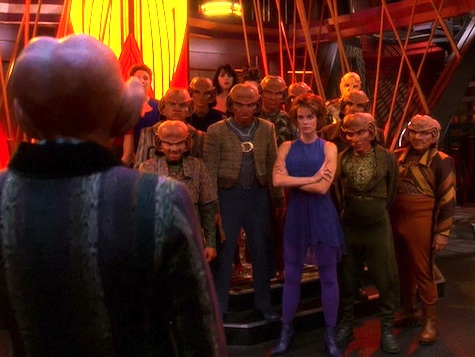
Dax and Worf are returning from the holosuite when they capture a thief who has in his possession Worf’s tooth sharpener. Worf brings him to Odo’s office, where the Klingon bitches that security breaches like this didn’t happen on the Enterprise. Odo smiles, as if he’s been waiting weeks for Worf to make a remark like this, and he proceeds to grab a padd on which he’s got called up the Wikipedia entries for “Rascals” and “A Matter of Time.” An open port of call like DS9 is a lot harder to secure than the flagship of the Federation, so stuff like this is going to happen and Worf is gonna have to get used to it, even though it irritates him.
Rom goes to Bashir for advice on union-forming while he’s treating O’Brien for a cyst, and while Bashir is cautious, O’Brien pushes Rom to go for broke and strike—which he does, presenting Quark with a list of demands. Quark laughs in their faces, so they go on strike. Quark continues to laugh until they all walk out and stand in front of the entrance encouraging people not to come into the bar.
Quark purchases a program from a Lissepian that will provide holographic waiters, but it doesn’t work very well, and Odo is under orders from Sisko not to do anything about the strikers as long as they remain peaceful and allow access through the second floor.
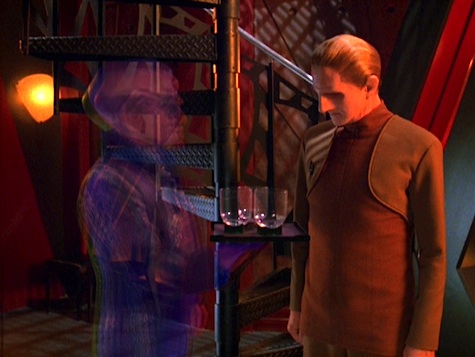
Bashir and O’Brien sit on the Promenade, taking friendly bets on who’ll walk by Quark’s and enter and who’ll pass by. To their surprise Worf actually crosses the picket line and enters, which leads to a violent disagreement that ends with the trio in a holding cell. After Sisko chews them out (and leaves the three in a single cell overnight), the captain meets with Quark. Sisko wants Quark to settle the strike, but Quark can’t, as even talking to strikers violates Ferengi law. Sisko’s less interested in Ferengi law than he is in who holds the lease on Quark’s Bar: the Federation, who haven’t charged rent, asked for maintenance fees, or charged for the bar’s power consumption. Sisko offers Quark a simple choice: provide the Federation with back pay for all that stuff, or talk to his brother. Quark, unsurprisingly, goes for the latter option.
Quark’s first instinct, of course, is to bribe Rom to end the strike. Rom refuses, instead quoting Karl Marx and Freidrich Engels: “Workers of the world unite: you have nothing to lose but your chains.” Quark is horrified, wondering what happened to his brother, and leaves.
And then Liquidator Brunt of the FCA shows up, with two Nausicaan enforcers. He’s there to help Quark end the strike. He walks in on the strike meeting. If they were on Ferenginar, they’d all be condemned to be tossed off the spire of the Tower of Commerce—but they’re not on Ferenginar, and they’ve been exposed to unwholesome Bajoran and Federation values. However, if they don’t go back to work the next morning, their accounts on Ferenginar will be seized and their families fined. But after he leaves, Rom points out that if their accounts on Ferenginar were such a big deal, they wouldn’t be waiters in a bar in the Bajoran system. So the strike continues.
After Rom walks Leeta to her quarters (she even kisses him on the forehead), Quark urges Rom to stop the strike, or the FCA will get serious. They answer to no one, and the Nausicaans aren’t for show. They could make Rom disappear and Quark won’t be able to protect him. But Rom—who has spent his entire life being bullied and put down by Quark—figures that if Brunt gets rid of Rom it solves all Quark’s problems.
Sure enough, Brunt says that he needs to make an example of someone—but, it turns out, it isn’t Rom that he’ll target. Go after the leader of a movement, you risk making a martyr. Instead, he needs to hurt someone Rom cares about: Quark.
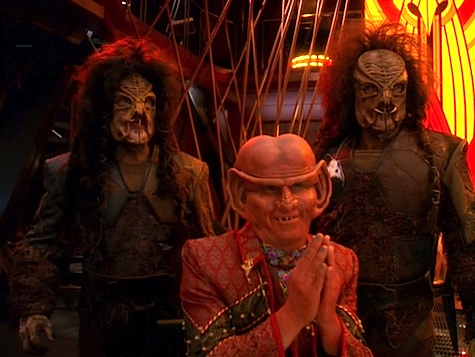
One severe beating later, Rom visits a badly injured Quark in the infirmary. Rom is actually gloating, since their positions are nicely reversed from earlier when Rom collapsed from the ear infection, but Quark is not going to press charges against Brunt and the Nausicaans (which is totally the name of my next band). Even if he did, the FCA would just send another liquidator.
But Quark has an alternate plan: if Rom dissolves the union, Quark will quietly, off the books, give in to all of Rom’s demands, from raises to sick leave.
Worf talks to O’Brien, first to apologize for the brawl, and then to announce that he’s going to live on the Defiant. When he actually moves on board, Dax gives him a housewarming gift of her favorite Klingon operas, which he can play as loud as he wants on the Defiant comm system when he’s alone on the ship. Dax, just like Odo and O’Brien before him, tell him that he’s going to have to get used to life on the station, but Worf finally begs to differ—perhaps it’s everyone else who’ll have to get used to him.
The Bajoran cleansing ritual is over, as is the strike, and everything in Quark’s is back to normal—with one major exception. Rom quits working for Quark’s and has signed on with the Bajoran Militia as a junior diagnostic engineer on the night shift. He promises to still do maintenance for Quark on the holosuites and replicators, but he needs to be his own man. Quark very reluctantly agrees, and gets him a snail juice, as he’s a paying customer now.
Can’t we just reverse the polarity? When Worf expresses annoyance to O’Brien about the technical difficulties on the station, O’Brien opines that he loves it so much more than the Enterprise because everything on the flagship worked. He was bored to tears most of the time…
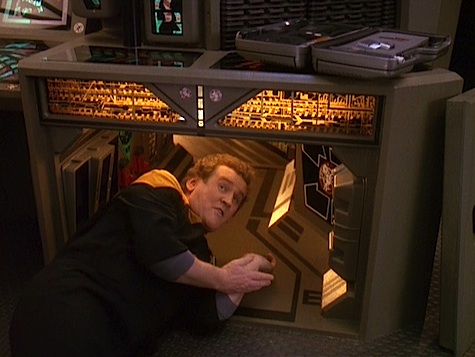
The Sisko is of Bajor: Just like in “Emissary,” Sisko blackmails Quark into doing the right thing. The scene in which he does so is a masterpiece of comic timing between Avery Brooks and Armin Shimerman.
Don’t ask my opinion next time: Kira’s only line in the episode is to break her time-of-cleansing fast with an eagerly ordered double hasperat and two synthales.
The slug in your belly: Worf has been tutoring Dax in the use of the mek’leth, following her admitting that it was a cool weapon in “Sons of Mogh,” and she’s getting the hang of it, which Worf only admits reluctantly.
There is no honor in being pummeled: Worf is still having trouble adjusting to life on the station, and he finally decides to take action. Since he’s in charge of the Defiant, and since he is, as Dax jokingly put it, in love with the ship, he moves permanently onto the vessel.
Preservation of mass and energy is for wimps: Odo actually is on Quark’s side when the strike hits, as he views strikes as being messy and antithetical to his sense of order.
Rules of Acquisition: Ferengi society and law both frown on unions and strikes—it’s a struggle for any of the Ferengi to even say the word “union.” Rom and Grimp quote two Rules at each other: #263 (“Never let doubt interfere with your lust for latinum”) and #211 (“Employees are the rungs on the ladder to success—don’t hesitate to step on them”).
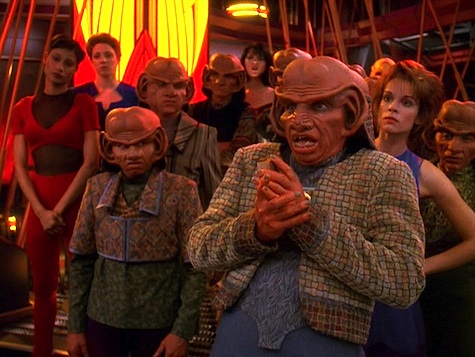
Tough little ship: The Defiant still doesn’t have all the kinks ironed out of it—Worf notices some sluggishness in the inertial dampeners—which Dax thinks will disappoint O’Brien after all the work he’s put into it.
Victory is life: Several times, Starfleet has ignored the warning received in “The Jem’Hadar” that any journey through the wormhole would be treated as an act of war, and in this particular episode they seem to be calling the bluff more formally, as it’s implied that Worf was ordered to take the Defiant into the Gamma Quadrant specifically to see if there’d be a response from the Dominion—which, after five days, there was not.
What happens on the holosuite stays on the holosuite: O’Brien brings Bashir into the holosuite for a program that re-creates the Battle of Clontarf, with O’Brien as King Brian Boru—O’Brien claims to be a direct descendent of Boru.
No sex, please, we’re Starfleet: Worf and Dax are still flirting with each other in multiple ways, from holosuite swordplay to verbal teasing (well, with Worf it’s not so much teasing as admonishing). Meanwhile, Rom obviously has a crush on Leeta, and Leeta is actually impressed by Rom in this episode—but Leeta’s also dating Bashir (she even compliments him on how good his legs look in his 11th-century Irish fighting garb).
At one point when Rom is talking to Leeta, he says his ear infection is probably from too much oo-mox. When Leeta asks who the lucky female is, he says he’s giving himself oo-mox, and when Rom (impressively brazenly) asks if Leeta can help, she says that Bashir may not approve, and Rom says she should ask him. This marks the first time Star Trek has referenced masturbation or polyamory, and it’s all in the same conversation…
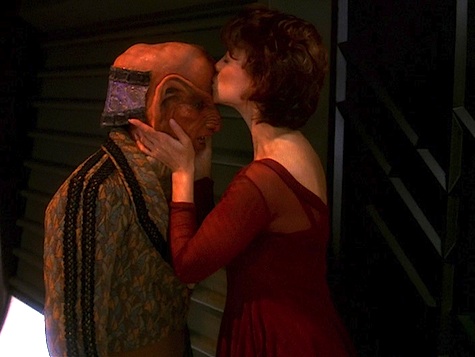
Keep your ears open: “I thought you weren’t afraid of the FCA?”
“I lied!”
Grimp and Frool when the latter grovels before Brunt.
Welcome aboard: Max Grodénchik and Chase Masterson are back as Rom and Leeta, while Jeffrey Combs’s Brunt officially becomes a recurring character by appearing again after “Family Business.” Jason Marsden and Emilio Borelli play Grimp and Frool. Professional darts players James Lomas and Shawn McConnell play the Nausicaans—they were cast specifically for the scene where the two enforcers throw darts at each others’ chests.
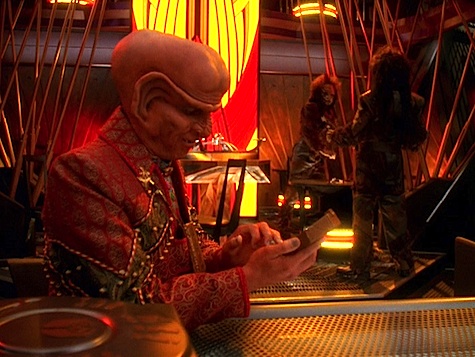
Trivial matters: While many fans thought Sisko’s harangue of Worf, Bashir, and O’Brien following the bar brawl was based on Kirk’s dressing down of Scotty, Chekov, and the others involved in the brawl in “The Trouble with Tribbles” (a dressing down that O’Brien and Bashir would become part of in “Trials and Tribble-ations”), Ira Steven Behr in fact based it on a scene in John Ford’s Fort Apache, when John Wayne’s Captain York upbraids three of his sergeants.
Armin Shimerman, who sits on the Board of Directors of the Screen Actors Guild, lists this episode about labor relations as one of his favorites.
Worf’s tooth sharpener, which was stolen from his quarters, is the one he bought from Nog before the latter went off to the Academy in “Little Green Men.”
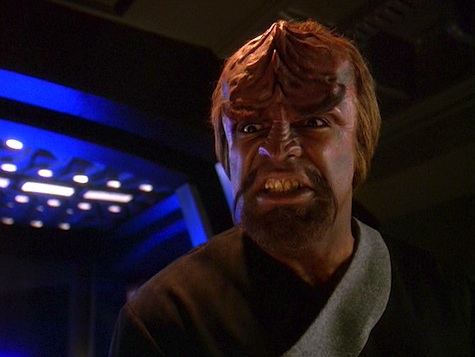
When the pitch for this story by Barbara J. Lee & Jenifer A. Lee was bought, it was intended to be used as a B-plot for one of the other stories this season, but it rapidly became clear that it dealt with issues too important to so relegate.
Walk with the Prophets: “Making me feel dumb made you feel smart.” I find myself loving this episode even more upon rewatching it because unions have come under such fire in recent times, and this is a classic reminder of why they came into existence in the first place, and how important they are. Using the Ferengi is a masterstroke, because they take exploitation to the max, but the lessons of this episode hold true anyhow. It’s classic Star Trek, using an alien species to illuminate a human issue, and while the allegory is in its own way as heavy-handed as that of “Let That Be Your Last Battlefield…”—especially with O’Brien waxing rhapsodic about his miner ancestor who died for workers’ rights in the early twentieth century—it’s far more effective because it isn’t played broadly.
In fact, this is one of the better Ferengi episode precisely because it isn’t played to ridiculous extremes. The shrill ludicrousness of the Ferengi is hardly seen at all here—even Frool’s groveling is played more as something pathetic than something funny. The episode takes the situation seriously.
More to the point, it takes Rom seriously, and Max Grodénchik is up to the task of being something other than comic relief. We’ve seen flashes of Rom taking charge of his life before, but in the past it was always related to other people—Nog in “Facets,” Ishka in “Family Business.” Here, it’s for himself, and it’s a great next step. I particularly like the way that Rom takes Quark’s usual digs—wishing he was an only child, emphasizing that Rom’s his employee not his brother—and throws it back in Quark’s face when Quark tries to play the family card in order to stop the strike.
And our insight to Quark is important, too. He does care about Rom, but it takes a lot to get him to remember that. He wants to be a good Ferengi who exploits everyone, which is why he lets Rom lie on the deck (well, that and he’s pissed about the lost business from the cleansing festival), but when push comes to shove, he wants to protect Rom, even after he gets beat up by the Nausicaans.
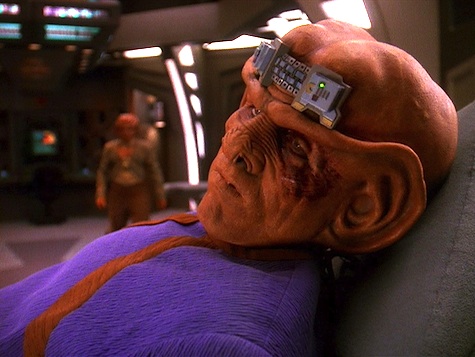
In the end, though, Rom doesn’t need Quark’s protection anymore, which is why the move to quit and become an engineer is the right one for the character to take.
Plus we get Jeffrey Combs back as Brunt. Whoever had the idea to give Brunt tiny tiny lobes should’ve gotten a raise, as he’s the classic bureaucrat, and Combs’s oily charm works magnificently.
The B-plot is a nice continuation of Worf fitting in, and I admire the step he takes here. Like Rom, he’s tired of trying to make the existing situation work, so he changes the situation, in his case by moving onto the Defiant. And they’re also taking advantage of the chemistry between Michael Dorn and Terry Farrell to move the Dax-Worf pairing forward, which is working out very nicely. Mention should also be made of the fact that, for the second time in four episodes, Odo and Worf have provided one of the most hilarious scenes extant, in this case with Odo throwing the takeover of the Enterprise by Ferengi doofuses and Berlinghoff Rasmussen’s con game in his face. I particularly adore that Odo had that padd just sitting there on his desk, waiting for the time when Worf would get snarky about the security on the station.
Warp factor rating: 9
Keith R.A. DeCandido reminds everyone that The Klingon Art of War is available for preorder from Amazon, Barnes & Noble, Indie Bound, or directly from the publisher. It’ll be out in May, and he’ll be debuting it at TrekTrax Atlanta at the end of April.











I am pretty sure we watched this one really close to Ash Wednesday, so the cleansing festival was kind of apt.
Also, unions! I live in Wisconsin, so that whole issue is kind of a big deal here! And I have to admit some of my favorite encyclicals are the labor ones.
Probably because unions aren’t what they used to be. The number of members in private sector unions is declining while the membership of public sector unions is increasing. It’s kind of hard to put the government in the role of the management exploiting the working class that is the classic union image. In theory the government exists to provide service to the public and is responsible to the public through our elected officials. So the workers are also the bosses. On the public side the unions have themselves become businesses with the primary purpose of protecting their own existence. Getting better deals for the workers / members is second. Or third, looking at the paychecks of some union officials. Long gone are the days when a union was all that stood between working for scraps in an unsafe environment. These days most employees are also shareholders in the company they work for, through their pension plans at the very least. Most companies understand that having engaged, respected employees who are fairly treated and like their jobs is much more profitable and sustainable in the long term. Which is the solution they come to here in the end of the episode.
There will always be those out there intent on demonizing unions, and while some of the complaints might be valid, the truth is we wouldn’t have basic working rights if it weren’t for them. Given the current state of capitalism today, it isn’t surprising to see such a strong voice against unions.
The 2007 writers’ strike wasn’t that long ago. Today, we have outstanding shows like Mad Men, Breaking Bad, amongst others. And the reason we have them is because someone fought battles to preserve the writers behind these shows, not only by defending their artistic vision, but by defending their basic working rights and enabling their livelihood. Otherwise, you couldn’t make a living solely as a writer.
Having said that, this is definitely one of my favorite Ferengi episodes. Once again, Ira Behr and Robert Wolfe take the situation seriously and make us care about the characters involved, despite the way the Ferengi were initially designed back in the 80’s.
It’s good, but I think I’d rate it a little lower than a 9. A lot of the important character moments are part of a long continuum and are really only clear when we know where they end up. This is especially true for the Worf/Dax pairing. When this first aired, it just felt like Dax was doing a but of flirting and nothing more. But I do give them kudos for advancing that relationship slowly and believably rather than the usual “character falls for guest star of the week”.
I also felt like the writers wrote themselves into a corner and had to do a bit of handwaving to resolve matters. I see no reason why any of Quark’s employees should believe he would keep this deal. I’m sure there must be a rule that is the Ferengi equivalent of “An oral agreement is worth the paper it’s printed on.”
There have been several episodes to show the lack of HIPAA in Starfleet…but here, Rom walks right up to Bashir when he’s with a patient. Kind of amusing.
Also, I love how they threw in a line about O’Brien being bored to tears in the transporter room.
Someone once pointed out to me that a strike is a breach of contract. It requires refusing to do something you signed a contract to do. Unions get away with it only because they lobbied to get themselves granted immunity from that law or, in some jusrisdictions, from any law at all.
So the Ferengi really should find Roms actions horrifying. They are a direct violation of the 17th Rule of Acquisition (A contract is a contract is a contract… among Ferengi), and must be seen by them as fundamentally immoral. And also illegal.
And if I agree that it is wrong to break your freely given word, I have to admit they have a point.
I forgot that prolific voice actor Jason Marsden was in this one. He’s done countless roles in animation, most notably Richie on Static Shock, Snapper Carr on Justice League, and Impulse on Young Justice, and he’s not only the only person I know of who’s professionally played both Clark Kent and Bruce Wayne, but the only one who’s played both of them and Dick Grayson. (He voiced teen Clark in Superman: TAS and young Bruce in Beware the Batman, he did the voice of “Scooby-Doo Robin” in Batman: The Brave and the Bold, and he played Burt Ward playing Robin in the live-action docudrama Back to the Batcave.)
The main thing that bugs me is that we never saw this month-long Bajoran cleansing ritual before or since. Are we to believe that no other episodes took place during that month of the Bajoran calendar? Or is the Bajoran year just really long? Come to think of it, how long is a Bajoran month? They’ve got something like five moons, so defining a month could be a pretty complicated process.
Last week was euthanasia, this week unions. This is going to be fun.
#3
Now, now, who are we to judge the Ferengi? If Quark wants to abuse his workers, he has the right to do so. It’s the Ferengi way after all. Profit comes first. Different cultures and all that.
Kidding, of course.
@6: It very much depends on the labor law in the respective country – I’m not sure, but I believe usually employers do not have to pay wages for the time of the strike (I may well be wrong, and that’s just a German specialty), so it’s more of a temporary suspension of the contract with the explicit purpose of renegotiating its terms, with the option to fall back on the previously agreed-on terms if no agreement is reached (which is the main difference to a mass quitting).
What surprised me more is the disapproval Ferengi show for unions in general – I didn’t get the impression in the past that they persecute cartels, so what’s supposed to be different about a workers’ cartel?